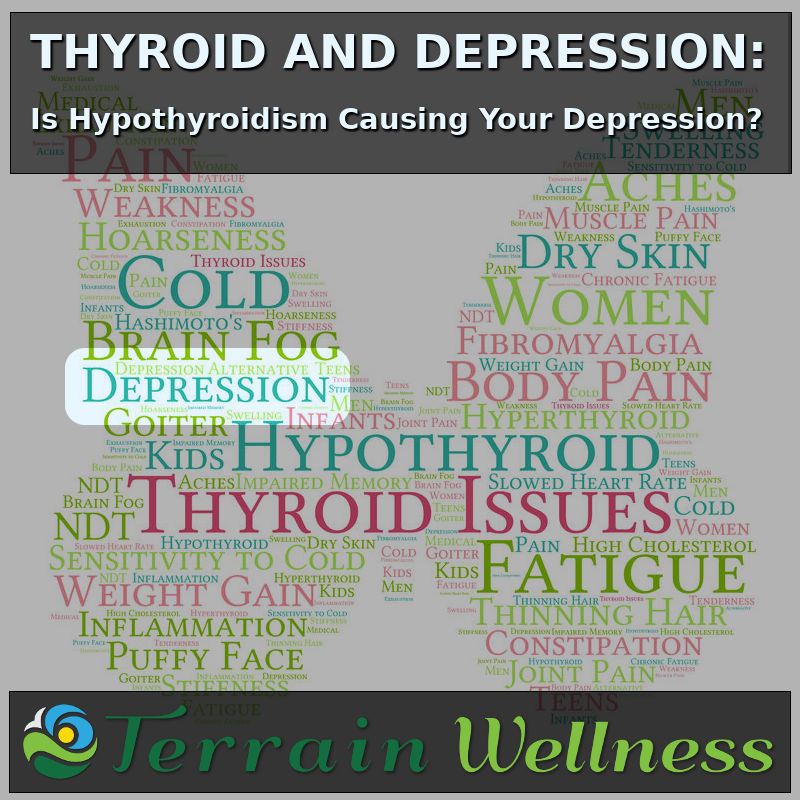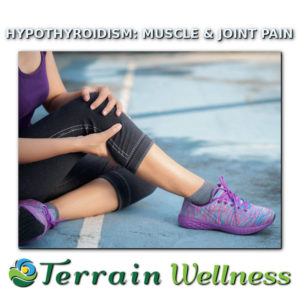Thyroid and Anxiety, Depression, Muscle Pain
Dr. Danielle Lockwood discusses thyroid issues:
depression, anxiety & muscle pain

Portland, Oregon
- Thyroid and Depression:
- Hypothyroidism and depression have been clearly linked together in numerous medical research studies. A hormone called serotonin is highly influential in the human emotion we call happiness. Imbalanced thyroid health negatively affects the body’s ability to create and properly regulate serotonin. As such, hypothyroidism has a clear and profound effect on one’s mood and happiness in life. In my clinical practice in Portland, Oregon, I have seen dramatic improvements in patients’ happiness and life satisfaction after treating the underlying causes of their hormone imbalance.
- Thyroid and Anxiety:
- Another symptom of endocrine imbalance is the well-documented link between hypothyroidism and anxiety. This imbalance causes disruptions in complex hormonal systems involving thyroid, catecholamine and dopamine. Interestingly, healthy levels of the hormone dopamine are directly linked to feelings of pleasure, while dopamine imbalance is clearly linked with feelings of anxiety. In this way, low T3 causes anxiety by disrupting catecholamine and dopamine while also decreasing feelings of life satisfaction.
Further Reading: Thyroid And Anxiety.
- Thyroid Joint & Muscle Pain/Weakness
- Muscle and joint pain often accompany cases of hypothyroidism. This is related to complex hormone imbalances that involve blood sugar and an overtaxed endocrine system. The exact mechanism is a complex cascade of reactions in the body. Stress raises adrenaline, adrenaline triggers cortisol, an inflammatory hormone that helps the body recover from stress. Over time, excess cortisol triggers inflammation, weight gain and causes the body’s estrogen to build up to unhealthy levels (estrogen dominance). In turn, estrogen dominance causes a number of health concerns, one of which is that the liver releases more Thyroid Binding Globulin, resulting in less active thyroid hormone (T3) in the body. These cascading health consequences come together to produce the swollen, painful joints and weak, aching muscles associated with hypothyroidism. Weak, aching muscles, cramps, stiff joints, body pain and general fatigue paint the general picture. Stress, latent infections, toxins, past trauma, diet, gut health and environmental factors can trigger the cascading effects of hypothyroidism, resulting in the painful muscles, weakness, body pain and sore joints that so many experience.
Basic thyroid tests are incomplete

In the course of my practice of medicine in Portland, Oregon, I frequently help patients with a variety of thyroid issues that may not always present themselves on basic lab tests. At times, patients may also exhibit atypical symptoms that may be related to endocrine function such as depression, anxiety and even muscle pain. To make matters worse, symptoms may begin to creep up and adversely affect patient health and wellness before standard thyroid function tests will show a problem. Basic T3/T4 tests are typically done on a pass/fail basis with “healthy” and “unhealthy” hormone levels labeled as either good or bad. However, the human body is rarely so binary (yes/no) in its state of health or lack thereof. Corroborating this deeper understanding, endocrinologists and researchers are continually uncovering the nuances that comprise the delicate balance of the human body’s hormone levels. Consequently, the medical community is slowly beginning to accept the fact that a one-size-fits-all testing procedure may not be the best solution for optimizing each individuals’ health. Unfortunately, there are still many otherwise skilled doctors who simply run a simple lab test as a pass/fail and either prescribe a drug or explain to the patient that their hormone levels are within the normal range and do not warrant attention. Perhaps predictably, using this overly simplistic approach to treat the human endocrine system does not always create the best results. Standard lab tests will often only indicate a clinically low result when the patient’s thyroid gland is functioning 60% lower than normal. As a doctor, I don’t think it’s a good practice to wait until things get that bad before we do something. To me, it’s a far better option to maintain healthy hormone function rather than letting patients’ endocrine system sink so far into disarray before intervening.
At this point, you may be wondering what endocrine function has to do with with thyroid and anxiety, depression and muscle pain. As it turns out, a lot.
Low Thyroid and Anxiety, Depression

Low thyroid hormone output can suppress the “happy” neurotransmitter, serotonin. Consequently, low levels of serotonin is a causal factor in clinical depression. A 2002 study reviewed numerous evidence-based research studies showing that patients with diagnosed hypothyroid showed a reduced 5-HT response, a precursor to serotonin. Reduced 5HT response in the body means that the body’s production of serotonin was also reduced. Low T3 levels in the body dampen the ability to produce the chemical needed to feel happy. And, without healthy serotonin levels, the spiral of negative feelings of fear and intense sadness can take over. Feeling sad for prolonged periods of time leads to aching muscles or simply feeling tired, exhausted and hopeless.
Similarly, hypothyroidism also frequently induces feelings of anxiety due to disrupting catecholamine and dopamine. Dopamine is a neurotransmitter that gives feelings of pleasure and satisfaction in life, disruptions in dopamine levels results in feelings of anxiety. Combine this with the fact that hypothyroidism also affects serotonin, and we get a clear clinical picture of patients experiencing symptoms of anxiety and depression as a result of this deeper hormone imbalance.
Resolving Problems With Thyroid and Anxiety, Depression
The positive note here is that many patients in studies resolved their depression and other low-serotonin symptoms after their low-thyroid condition was properly treated. The other good news is that there are now many natural and effective ways to help support healthy thyroid function ranging from herbs, dietary/lifestyle changes, acupuncture and other natural remedies all the way up to and including naturally derived sources of thyroid hormones. That said, as a doctor practicing naturopathic medicine, I only prescribe hormone medications in more extreme circumstances and will continue to work with patients so that their health progresses to the point where taking a hormone can be minimized or deemed no longer necessary.
Thyroid & muscle, joint pain

When the above facts are taken into consideration, we are able to develop a much wider picture of patient health and can get to the root of some problems with mood, anxiety and muscle pain by addressing the underlying cause of thyroid function. A connection between thyroid function and chronic muscle pain is beginning to emerge in the research as well. This is especially if endocrine function is connected to any autoimmune condition, or chronic digestive complaints. Often treating the thyroid, cleaning up the gut (improving digestive health) and supporting the body’s own natural anti-inflammatory responses can work tremendously to alleviate or even clear chronic muscle and joint pain.
Terrain Wellness: Naturopathic Doctors in Portland, Oregon
At Terrain Wellness, we’re accepting new patients and helping people overcome hormonal issues using safe, natural herbs, acupuncture, remedies and prescription hormone replacement when necessary. Naturopathic medicine and endocrine health go hand in hand. In my medical practice, we have had repeated success with naturopathic treatments for resolving symptoms related to Hashimoto’s. Patients come to us at our conveniently located SW Portland Medical Office from near and far because we give every patient our best and strive to become even better at what we do every day. Please, call us today to book an appointment with me, Dr. Danielle Lockwood, to get help with your endocrine balance today.
